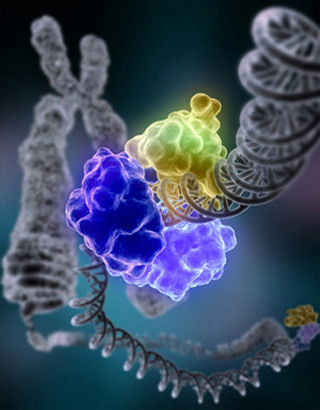
DNA repair. To cope with exposure to DNA-damaging agents, such as the sun's radiation or by-products of our normal metabolism, powerful DNA damage checkpoints have evolved. Once DNA damage checkpoints detect DNA lesions, cellular proliferation is stopped immediately and DNA repair is initiated. (Image courtesy of Tom Ellenberger, Washington University School of Medicine in St. Louis.)
Instructor(s)
Dr. Hans Christian Reinhardt
MIT Course Number
7.341
As Taught In
Fall 2008
Level
Undergraduate
Course Description
Course Description
Cellular responses to DNA damage constitute one of the most important fields in cancer biology. In this class we will analyze classical and recent papers from the primary research literature to gain a profound understand of cell cycle regulation and DNA damage checkpoints that act as powerful emergency brakes to prevent cancer.
This course is one of many Advanced Undergraduate Seminars offered by the Biology Department at MIT. These seminars are tailored for students with an interest in using primary research literature to discuss and learn about current biological research in a highly interactive setting. Many instructors of the Advanced Undergraduate Seminars are postdoctoral scientists with a strong interest in teaching.
Other Versions
Other OCW Versions
Archived versions: ![]()


